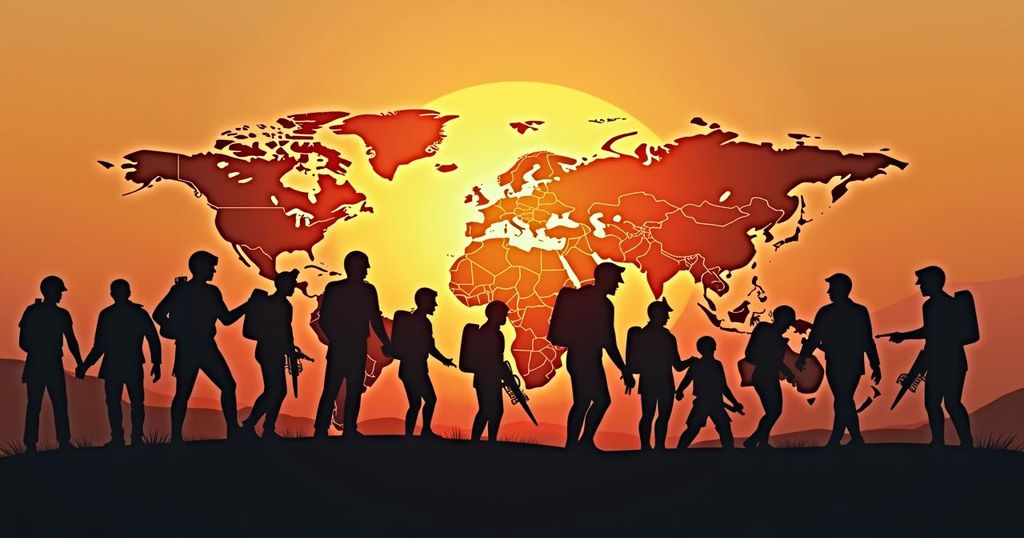Current Humanitarian Crises Across Key Global Regions: An Overview

Ongoing conflicts in Lebanon have resulted in around 1,700 deaths, extensive displacements, and a humanitarian crisis. Violence persists in the Occupied Palestinian Territory and Israel, with numerous casualties reported. Gaza faces severe healthcare supply shortages despite ongoing vaccination efforts. Syria’s humanitarian needs are rising due to continued violence. Haiti contends with gang violence causing rising displacements, while Ukraine suffers civilian casualties from attacks. Eastern Africa experiences one of the world’s largest humanitarian crises, requiring urgent funding and assistance.
The ongoing conflict in Lebanon has resulted in severe casualties and displacements, with the United Nations Office for the Coordination of Humanitarian Affairs (OCHA) reporting that around 1,700 individuals, including 38 healthcare workers, have lost their lives since the escalation began in October 2023. Additionally, over 9,000 citizens have sustained injuries, and more than 346,000 people have been confirmed as displaced. Displacement figures could potentially reach 1 million, with over 155,000 individuals currently residing in shelters that are nearing full capacity. The humanitarian situation has been exacerbated by restrictions on movement and access to essential services, with six hospitals and 40 healthcare centers forced to close due to airstrikes and damage to roadways. Efforts to provide assistance are underway, including the UN’s recent $426 million Flash Appeal to support humanitarian responses, yet more aid is required urgently. In the occupied Palestinian territory and Israel, violence continues to escalate. In Jaffa, seven individuals, including a young girl, were killed in an attack attributed to perpetrators from the West Bank. In the ensuing retaliatory operations, Israeli forces executed raids in Hebron, where the attackers originated. The total reported deaths in the West Bank since October 7, 2023, stand at 697 Palestinians, while 23 Israelis have been killed in attacks conducted by Palestinians. OCHA reiterates the importance of protecting civilians and adhering to the laws of armed conflict. In Gaza, preparations for a polio vaccination campaign are set to commence, with healthcare providers reaching approximately 300,000 individuals weekly. However, a significant shortage of medical supplies persists, further hindering the delivery of essential health services. Syria is also reeling from the effects of ongoing conflicts, with airstrikes near the capital Damascus resulting in civilian casualties and jeopardizing humanitarian efforts in the region. Reports indicate that attacks in Idleb have displaced hundreds of families and created material destruction to health facilities. Haiti faces escalating gang-related violence, leading to over 700,000 internally displaced persons, among whom many are children. The humanitarian crisis is compounded by a lack of adequate funding, with the Humanitarian Response Plan currently only 39 percent funded. UNICEF is committed to supporting the resumption of education for displaced children in a turbulent environment. In Ukraine, multiple civilian casualties resulted from attacks in Kherson City, alongside significant damage in Zaporizhzhia. Energy infrastructure has also faced disruption, resulting in mandatory evacuations in the Sumy region. Eastern Africa remains in dire need, with nearly 67 million individuals requiring humanitarian assistance. This need is driven by a combination of conflicts, climate-related disasters, and various outbreaks that have placed unparalleled pressure on local and international response systems. OCHA emphasizes the urgent requirement for funds to support the extensive humanitarian responses needed across the region.
The article addresses the current humanitarian crises unfolding across several regions, including Lebanon, the Occupied Palestinian Territory and Israel, Syria, Haiti, Ukraine, and Eastern Africa. It highlights critical incidents of violence, the resulting humanitarian needs, and the ongoing efforts by international organizations, particularly the United Nations, to provide relief and support. Each region presents unique challenges that are exacerbated by conflict, displacement, and lack of resources, necessitating immediate action and substantial international support in addressing these pressing humanitarian needs.
In summary, the humanitarian situations in Lebanon, the Occupied Palestinian Territory, Syria, Haiti, Ukraine, and Eastern Africa reflect a complex web of conflict-driven crises that have resulted in extensive loss of life, significant displacement, and dire shortages of essential services. Concerted efforts from international organizations and member states are crucial to provide the necessary support and resources to mitigate these crises and restore stability and access to essential humanitarian assistance across these regions.
Original Source: www.unocha.org







